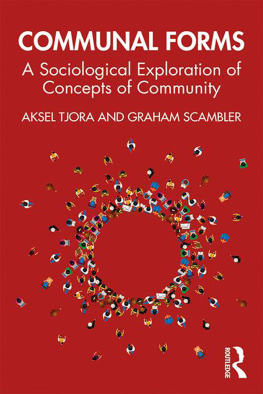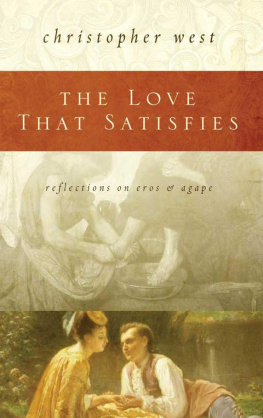Sociology of Love
Gennaro Iorio
Copyright 2015 Vernon Press, an imprint of Vernon Art and Science Inc, on behalf of the author.
All rights reserved. No part of this publication may be reproduced, stored in a retrieval system, or transmitted in any form or by any means, electronic, mechanical, photocopying, recording, or otherwise, without the prior permission of Vernon Art and Science Inc.
www.vernonpress.com
In the Americas: Vernon Press 1000 N West Street, Suite 1200, Wilmington, Delaware 19801 United States | In the rest of the world Vernon Press C/Sancti Espiritu 17, Malaga, 29006 Spain |
Library of Congress Control Number: 2014935524
ISBN 978-1-62273-163-3
Product and company names mentioned in this work are the trademarks of their respective owners. While every care has been taken in preparing this work, neither the author nor Vernon Art and Science Inc. may be held responsible for any loss or damage caused or alleged to be caused directly or indirectly by the information contained in it.
Table of Contents
1.1 The Rediscovery of Love
1.2 What Method of Research
1.3 The Concept of Agape
1.4 Definition of agape
1.5 Five dimensions of agape
1.6 Six agapic propositions
1.7 Conclusion
2.1 Eros
2.2 Philia
2.3 Gift
2.4 Conclusion
3.1 Georg Simmel
3.2 Max Weber
3.3 Pitirim A. Sorokin
3.4 Conclusion
4.1 The subject, identity and inter-subjectivity.
4.2 Genealogy of the West
4.3 Conclusion
5.1 Perlasca
5.2 Peer-to-Peer
5.3 Divjak: Political Resistance
5.4 Conclusion
Preface
An initial research into a fundamental idea of social life is a complex job that is difficult to represent. Such diversity is particularly expressed in regards to love which is analyzed according to a plurality of styles and methods. Poetry, songs, psalms, romance books, biological and medical treatises, cultural inquiry, philosophical and theological analyses and practical manuals are all relevant for an understanding of the theme of love. Let us immediately state that this essay does not intend to review all of this literature, but will rather address a specific aspect; that is, the expressions of agapic love. It will not only be specific then, but it will consider at the sociological aspect of agapic love. This work will have two goals: the first will look at the conceptual definition of agape, while the second will try to make the concept operational for an interpretation of sociality at a micro level, of face-to-face relationships. It will attempt to so at the macro level as well: for historical processes lasting for long periods, yet without refuting the middle level, that is, for individual cases or actions interpretable by using the concept of agape. The more general aim is to introduce a new concept into the sociological lexicon, not out of an ideological spirit, but starting from the awareness that a sociality exists, made of people, relationships and actions, which the available tools of interpretation cannot render legible in its empirical manifestation. There is a seen but not recognized sociological interpretation, which impoverishes its very imagination. As Pierre Bourdieu had felt in the anthropological part of his work, there is a specific logic in the world of social interaction that is anchored to the logic of praxis. Such a dimension allows us to hypothesize that agape is known insofar as practical knowledge , before being built by interpretative categories (Bourdieu , 1972/1983). This argument poses a problem for the statute of the concept of agape which regards actions done by individuals in the realm of reality and is therefore not an ideal, nor is it a utopia or a deception. Also Axel Honneth, in questioning the notion of agape, glimpsed an interest if we could find traces of it beyond people and communities socialized towards an agapic ideal (Iorio and Campello, 2013).
We are certainly not the first to use the concept of agape in sociology as, before anyone else, it was used authoritatively by Luc Boltanski in the elaboration of his critical sociology. In particular, he uses the tool of political philosophy to remodel the cities associated with different forms of action, in order to delineate a regimen of peace-building actions in which tools offered by political philosophy are not very useful, therefore turning towards the tradition of Christian love, as studied only by theologians (Boltanski, 1990). That which we wish to reflect upon is not Christian sociology, since such a thing would be inconceivable and misleading for both dimensions of knowledge. We simply want to recognize the legitimacy in transferring a concept from a type of argument to another and, at the same time, the autonomy and the irreducibility of the one and the other. Hence, the objective remains the possibility of modelling empirically observable social action and not to offer a normative-ideal horizon to social action. This reflection is therefore closely connected to the historical situation and founded on the direct observation of reality, on the empirical data offered by experience, and will not be based om universal and abstract premises.
However, it would be interesting and useful to rethink the relationship between sociology and theology. This is because, if it be true that historically the social sciences in general and sociology in particular were born in order to free themselves from a certain dogmatic theology, it is also true that the course of sociological tradition and the relationship between the two disciplines has been in some cases very fruitful. One need only think of the concept of charism introduced by Weber in sociological lexicon, taking up the work of theologians. Starting from this concept, the German sociologist developed his theory of power, distinguishing it as rational, traditional and charismatic. This is power founded on devotion, an uncommon obedience to the leader, justified by either a sacred characteristic or by the moral values of a person. Weber studied in depth the characteristics and the functions of the history of charismatic leaders, be it in the religious field as in the political one. Another famous case regards the concept of habitus by Bourdieu , already delineated by the same Weber , and Elias . Medieval theological thought had developed the concept of supernatural habitus (Lonergan, 1970) to bring to the fore that beyond the gratia gratis data, that is, divine grace given gratuitously, there is also the gratia gratum faciens, which expresses the necessity on the humans part to respond to the grace given. Such a concept of habitus had been elaborated in antithesis to the lower-medieval idea of I cannot help sinning, that this, the impossibility of remaining on the straight path without Gods intervention, underlining here the responsibility on the part of the human being, his freedom, a fundamental premise to nascent modernity. Thomas Aquinas traced a middle road between the two positions and defined that the gratum faciens contains both an influx of God on the grace given, as well as the consequent actions of co-operative grace by humans. Therefore, the concept of habitus, so essential to contemporary sociology, has its origins in its very relationship with theology, often forgotten and not explained by its very users. We retain that also













